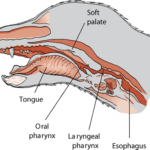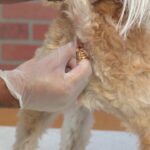Why Does My Dog Dry Heave
Why Does My Dog Dry Heave: Causes, Symptoms, and Treatment
If you have ever heard your dog make strange choking or gagging sounds without producing vomit or food, you may wonder why does my dog dry heave? While occasional dry heaving may not be a serious problem, persistent or severe episodes could indicate various underlying health issues that require veterinary attention. In this article, we will explore some common causes of dry heaving in dogs, signs to watch for, and options for diagnosis and treatment.
What Is Dry Heaving in Dogs?
Dry heaving, also known as retching or gagging, is a reflex action of the respiratory and digestive systems that aims to expel irritants, foreign objects, or excess mucus from the throat or the stomach. Unlike vomiting, which involves the forceful expulsion of contents from the stomach through the mouth, dry heaving usually produces only air and saliva. Dry heaving can also be accompanied by other symptoms such as coughing, wheezing, drooling, lethargy, loss of appetite, fever, or breathing difficulties.
Causes of Dry Heaving in Dogs
Many factors can trigger dry heaving in dogs. Here are some common ones:
1. Dietary Issues
If your dog eats too fast or too much at once, they may swallow air along with their food and cause bloating or regurgitation. Some dogs may also develop food intolerances or allergies that lead to nausea and vomiting. Additionally, ingesting toxins such as household chemicals, medications, plants, or spoiled food can irritate the gastrointestinal tract and induce dry heaving.
2. Respiratory Problems
Dogs with respiratory infections such as kennel cough or pneumonia may experience dry heaving due to inflammation and congestion in their airways. Similarly, dogs exposed to secondhand smoke or environmental pollutants may develop irritation or damage to their lungs and throat that triggers coughing and retching.
3. Foreign Objects
Dogs are curious creatures that like to explore their surroundings with their mouths. Unfortunately, this habit can sometimes lead to them ingesting foreign objects such as toys, bones, sticks, or rocks that get stuck in their throat or digestive system. Dry heaving is a common symptom of choking or obstruction.
4. Gastrointestinal Disorders
Several diseases and conditions affecting the stomach, intestines, pancreas, liver, or gallbladder can cause dry heaving in dogs. These include gastritis, gastroenteritis, inflammatory bowel disease (IBD), pancreatitis, liver disease, and gallstones. Some breeds are also more prone to certain gastrointestinal issues than others.
5. Stress and Anxiety
Like humans, dogs can experience stress and anxiety that affect their physical health. Dogs may dry heave as a result of separation anxiety, fear of loud noises or new environments, boredom, or changes in routine or family dynamics. In some cases, psychological factors may exacerbate an underlying medical condition.
Symptoms of Dry Heaving in Dogs
Dry heaving alone may not be a reliable indicator of your dog’s health status since it can occur for various reasons. However, if you notice any of the following signs along with dry heaving in your dog, it may signal a more serious problem:
– Persistent or frequent episodes of dry heaving
– Abdominal bloating or distension
– Vomiting or regurgitation of food or bile
– Diarrhea or constipation
– Loss of appetite or weight loss
– Dehydration or lethargy
– Painful abdomen or back
– Coughing up blood or foam
– Difficulty breathing or swallowing
If your dog exhibits any of these symptoms, you should contact your veterinarian immediately for a proper diagnosis and treatment plan.
Diagnosis and Treatment Options for Dry Heaving in Dogs
To determine the underlying cause of your dog’s dry heaving, your veterinarian may perform a physical exam, blood work, fecal analysis, urine analysis, x-rays, ultrasound, or endoscopy. Depending on the results, your vet may recommend one or more of the following treatments:
1. Dietary Changes
If your dog’s dry heaving is related to their diet, you may need to change their feeding habits or switch to a different type of food that suits their needs. Your vet can provide guidance on how to feed your dog properly and avoid potential irritants or allergens.
2. Medications
Depending on the diagnosis, your vet may prescribe medications such as antibiotics, anti-inflammatory drugs, anti-nausea drugs, proton pump inhibitors (PPIs), or laxatives to address any infection, inflammation, pain, or digestive issues.
3. Surgery
In some cases where foreign objects or tumors are causing obstruction or damage to the gastrointestinal tract, surgery may be necessary to remove them.
4. Behavioral Modification
If your dog’s dry heaving is caused by stress or anxiety, you may need to modify their environment or behavior to reduce triggers and promote relaxation. This can include providing more exercise and mental stimulation, using calming aids such as pheromone sprays or supplements, or seeking professional help from a certified animal behaviorist.
Conclusion
Dry heaving in dogs can be a sign of various health issues ranging from mild to severe. By understanding the common causes and symptoms of dry heaving in dogs and seeking timely veterinary care when needed, you can help ensure your furry friend stays healthy and happy. Remember to observe your dog’s behavior closely and communicate with your vet about any concerns you have regarding their well-being. And if all else fails, try making them laugh – after all, they say laughter is the best medicine for humans and dogs alike!



